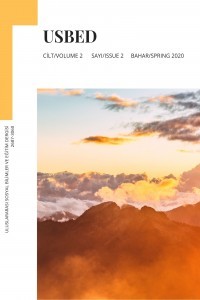Köy Okulu Yöneticilerinin Salgın Döneminde Uygulanan Uzaktan Eğitime Yönelik Deneyimleri
İnsanlık, çağlar boyunca birçok hastalık ve salgınlarla mücadele etmiştir. Günümüzde yine insanlık dünya çapında bir salgına dönüşen Koronavirüs 2019 (Covid-19) pandemisiyle başa çıkamaya çalışmaktadır. İnsanları sosyal, ekonomik ve psikolojik olarak etkilemeye devam eden pandemiyle birlikte sosyal olgulardan biri olan eğitimde de büyük sorunlar yaşanmıştır. Özellikle kırsal kesimde eğitim gören çocukların karantina döneminde uzaktan eğitime erişimde çeşitli sorunlar yaşadıkları görülmüştür. Bu bağlamda, bu çalışmada Covid-19 pandemisi döneminde uygulanan uzaktan eğitime yönelik köy okulu yöneticilerinin deneyimleri incelenmiştir. Nitel araştırma yaklaşımın benimsendiği bu çalışmada, fenomonoloji deseni kullanılmıştır. Araştırmanın çalışma grubu 2020-2021 eğitim-öğretim yılı güz döneminde Tokat ili köylerinde bulunan ilkokul ve ortaokullarda görev yapan 17 okul yöneticisinden oluşmaktadır. Araştırmanın verileri, araştırmacı tarafından oluşturulan “yarı yapılandırılmış görüşme formu” yardımıyla okul yöneticileri ile yapılan uzaktan görüntülü görüşme yoluyla toplanmıştır. Araştırmada elde edilen veriler ise “içerik analizi tekniği” ile analiz edilmiştir. Araştırma sonuçları, Covid-19 pandemi sürecinde uzaktan eğitimde en çok kullanılan araçların EBA, Zoom ve WhatsApp uygulamalarının olduğunu göstermiştir. Köy okul yöneticilerine göre pandemi döneminde uzaktan eğitimde en fazla karşılaşılan sorunlar; öğrencilerin derslere düşük katılımı, öğrencilerin motivasyonlarının düşüklüğü, uzaktan eğitime erişim cihazlarının ve internetin yetersizliği, etkin olmayan ölçme/değerlendirme yapılması ve velilerin bu sürece ilgisizliği olmuştur. Köy okulu yöneticileri uzaktan eğitimde karşılaşılan bu sorunlara ilişkin olarak teknolojik yeterlik, üst yönetim ve uzaktan eğitimin uygulanması bağlamında çeşitli öneriler getirmiştir. Bunlar arasında öğrencilere internet erişimi olan tablet dağıtılması ve internet alt yapısının iyileştirilmesi gibi öneriler öne çıkmaktadır.
The Experiences of Village School Administrators regarding the Distance Education during the Pandemic Period
Humanity has struggled with many diseases and epidemics throughout the ages. Today, humanity is still trying to cope with the Coronavirus 2019 (Covid-19) pandemic, which has turned into a worldwide epidemic and is considered a pandemic. The pandemic has affected people socially, economically and psychologically. Due to the pandemic, there have been major problems in education, which is one of the social phenomena. It has been observed that especially children studying in rural areas experience various problems in accessing distance education during the quarantine period. With this motivation, in this study, the experiences of village school administrators for distance education applied during the Covid-19 pandemic were examined. In this study, in which a qualitative research approach was adopted, the phenomenology design was used. The study group of the research consists of 17 school administrators working in primary and secondary schools in the villages of Tokat province in the fall semester of the 2020-2021 academic year. The data of the study were collected by remote video interview with the school administrators with the help of the "semi-structured interview form" created by the researcher. The data obtained in the research were analyzed with the "content analysis technique". The results of the research have shown that the most used tools in distance education during the Covid-19 pandemic process are EBA, Zoom and WhatsApp applications. According to village school administrators, the most encountered problems in distance education during the pandemic period; low participation of students in classes, low motivation of students, inadequacy of distance education access devices and internet, ineffective assessment/evaluation and indifference of parents. Village school administrators have made various suggestions regarding technological competence, senior management and the application of distance education in relation to distance education. Among these, suggestions such as distributing tablets with internet access to students and improving the internet infrastructure come to the fore.
___
- Altunışık, R., Coşkun, R., Bayraktaroğlu, S., & Yıldırım, E. (2010). Sosyal bilimlerde araştırma yöntemleri uygulamalı SPSS. (6. Baskı). Sakarya: Sakarya Yayıncılık.
Altuntaş, E. Y., Başaran, M., Özeke, B., & Yılmaz, H. (2020). Covid–19 pandemisi sürecinde üniversite öğrencilerinin yükseköğretim kurumlarının uzaktan eğitime yönelik stratejilerine ve öğrenme deneyimlerine ilişkin algı düzeyleri. Halkla İlişkiler ve Reklam Çalışmaları E-Dergisi, 3(2), 8-23.
